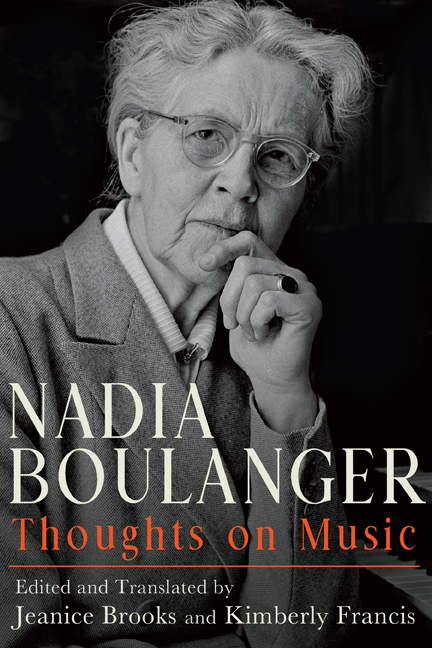Book contents
- Frontmatter
- Contents
- List of Illustrations
- Acknowledgments
- Editorial Apparatus and Critical Notes
- Note on Translations
- List of Abbreviations
- Timeline of Nadia Boulanger’s Life
- Introduction
- Part One Journalism, Criticism, Tributes
- Part Two Lectures, Classes, Broadcasts
- Bibliography of Nadia Boulanger’s Published Writing
- General Bibliography
- Index
“Les Grands Concerts, Béla Bartok” Spectateur 3, no. 99 (April 22, 1947): 6 (complete text)
Published online by Cambridge University Press: 15 October 2020
- Frontmatter
- Contents
- List of Illustrations
- Acknowledgments
- Editorial Apparatus and Critical Notes
- Note on Translations
- List of Abbreviations
- Timeline of Nadia Boulanger’s Life
- Introduction
- Part One Journalism, Criticism, Tributes
- Part Two Lectures, Classes, Broadcasts
- Bibliography of Nadia Boulanger’s Published Writing
- General Bibliography
- Index
Summary
Concerts Reviewed
April 22, 1947 (Orchestre national, radio broadcast)
Violin Concerto, Béla Bartók
Concerto for Orchestra, Béla Bartók
The Festival of the works of Béla Bartók became something of a revelation. Béla Bartók! It was a beautiful name, and not much more for most people. We knew that the musician who bears it is famous. We did not know his music quite so well, to tell the truth. Certain works of his, of an extremely complex technique, had caused him to be classed among the “fearsome” composers. The artists who dominate our era were not discussed without mentioning his name. But … we hardly went further. And, suddenly, the audience, the public at large, who knows nothing and yet knows everything, understood. The music of Béla Bartók has truly been heard, finally. From the first notes, attention inhabited the hall, without letting up for a moment. Each person, suddenly awake, present, took part. It felt as if a great thought made accessible those domains toward which we all try to go without ever reaching them. What communion between people who were brought together by chance alone. And we are reminded of Béla Bartdk's delicate, ardent face. His whole life of struggle, of solitude. And what joy he would have had, for selfless reasons, to see his music conquer minds and hearts day after day. Why must we always understand too late? Alas, Jean Cocteau says it only too clearly: “Lorsqu’une oeuvre semble en avance sur son époque, c’est simplement que son époque est en retard sur elle.” [When a work seems ahead of its time, it is simply that its time is late for it.] And Stravinsky: “If people would only run with me, it would be so easy, but they run ten years behind.” A joke, perhaps, but it is a joke that leaves us full of melancholy and remorse. The moment has passed when Béla Bartok could be thanked. But, the other night, Valéry's words returned to my mind:
La plus grande gloire imaginable est une gloire qui demeurera toujours ignorée de celui qui l’obtient. Elle est d’être invoqué secrètement, d’être imaginé et placé par un inconnu dans ses pensées les plus mystérieuses pour lui servir de témoin, de juge, de maître, de père et de contrainte sacrée.
- Type
- Chapter
- Information
- Nadia BoulangerThoughts on Music, pp. 277 - 279Publisher: Boydell & BrewerPrint publication year: 2020



